Our “Yummy” Collection of Food and Drinks from Around the World
Posted by Ariane on Feb 28, 2014 in Countries | 4 comments
Summary: Who doesn’t like food? Check out our 20 favorite dishes and drinks that we discovered during our 16 months of travel.
While traveling, one of the things that can be quite challenging is food. When you discover a country, everything is new, including what you eat. The language barrier doesn’t help you get information about the ingredients of dishes, so most of the time you just have to try. The good thing is that usually the experience is rewarding. We want to share with you the different food and drinks we discovered during our 18 months of travel, and the one we liked the most.

Vegetarian Silpancho In Bolivia
Tacos and Burritos
Having been living in the Middle East for a long time, we hadn’t had the chance to taste any Mexican food (which is not very popular in this part of the world, or even in France, as it is only in the past few years that you can easily find Mexican food here).
A burrito, or taco de harina, is a type of Mexican-American food. It consists of a wheat flour tortilla wrapped or folded into a cylindrical shape to completely enclose the filling (Wikipedia), which consist of fried beans, meat, or rice as a base and any additional ingredients that you might want to add, such as avocado, salads, sauces, vegetables, etc.
We enjoyed tacos and burritos while in Canada and the US especially Los Angeles.
Sopa de mani
Though we didn’t enjoy the food in South America that much, there are a few dishes that we really appreciated. The Bolivian and Ecuadorian almuerzos (set lunches) all contain soups as a starter.

Sopa de Mani
The one we liked the most was “la sopa de mani,” which is a delicious peanut and potato soup.
Sopa de mani is typically made with beef ribs or chicken, but it works well as a vegetarian soup too.
Yuca
Also known as manioc, cassava, or tapioca, this is a kind of root that looks and tastes pretty much like a potato. This vegetable is served typically with all Bolivian dishes . I loved it. (I’m a potato lover, and friends of my friends are my friends too!)
Plantain
We first discovered plantain in a Dominican restaurant in New York. I loved it from the first time I tasted it, which is a good thing because, just like the yuca, plantain is almost always part of Bolivian dishes, so we had it a lot in South America.

Fried plantain with cheese, eggs and avocado in New York
Humitas
Humitas is a Native American dish from pre-Hispanic times, and a traditional food in Argentina, Bolivia, Chile, Ecuador, and Peru. It consists of masa harina (traditional flour) and corn, slowly steamed or boiled in a pot of water. In Brazil it is known as pamonha (Wikipedia).
Though we couldn’t have humitas as much as I would have liked because it is sometimes cooked with pork fat, this is a very tasty and also very cheap breakfast or snack. In Ecuador they have it with coffee.
Churros with Chocolate
When we arrived in Madrid after more than two years in North America, the first thing we were so happy to find was European food. We thought that Europe was indeed a heaven for food lovers. During our ten days in Madrid we enjoyed many different kinds of food, but our favorite was definitely churros dipped in hot black chocolate.
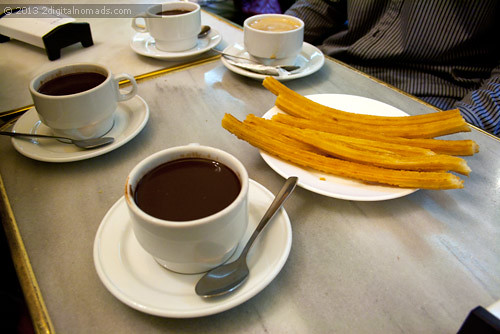
Churros with chocolate in Madrid
Roti/Daal
Indian food is simply our favorite. There are so many advantages for us with Indian food—it is almost like a familiar refuge for us in the unknown food jungle. First, we both love it. Second, it is available everywhere around the world. Third, it is usually cheap. Fourth, even if the restaurant is lacking in the cleanliness and sanitation department, there are so many spices in the food that you don’t risk much and it always tastes good. Finally, it is easy to find halal or vegetarian dishes.
When we arrived in Malaysia the first thing that amazed us was the huge social diversity, which includes the Indian community. We already knew quite a lot of Indian dishes, but the very basic and delicious roti (Indian bread) and daal (yellow lentils stewed) helped us maintain our tight budget and enjoy one day after another of tasty breakfasts and dinners.
Nasi Lemak
Malaysia’s national dish. We discovered Nasi Lemak four days after we arrived in Malaysia. I was very tired after our late travel from Thailand and the first few days in Kuala Lumpur (which are always the most difficult ones). I was feeling very weak at the end of this fourth day, and it was like my blood pressure dropped. I picked up the Nasi Lemak dish in a food court and it appealed to me. After I ate, it was like I was boosted up and everything went back to normal. It was amazing how this food worked so quickly on my body condition!
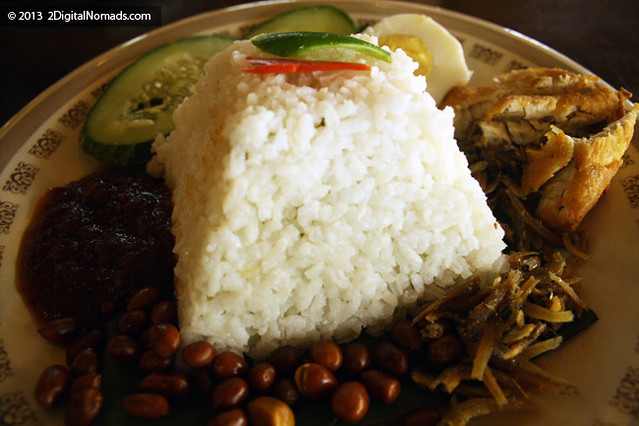
Nasi Lemak
Nasi Lemak is a dish made of steamed rice, peanuts, anchovies, boiled egg, cucumber, and spicy sambal sauce. It can also be served with meat or chicken—very nourishing indeed.
Fruits
Papaya
It is difficult to mention all the delicious fruits you can have in Asia, so these are just our favorites. Papaya for me is the kind of fruit where the more you have it, the more you like it.
Rose Apple
Another of our daily snacks. It is also easy to carry.

Rose apples by Grrrl on Flickr
Lychee Juice
One of my favorite drinks in Malaysia was the lychee juice or syrup.
French Pastries
Though there are many dishes and different kinds of food and drinks that one should taste in France, our favorite kind of food there are pastries—you just have to taste them all.
Tom Yam Soup
Tom Yam is already very famous world wide. The herbs and spices of this Asian dish are just so tasty, it is also one of our most recommended dishes.
Tapioca Leaves and Bamboo Chicken
This traditional Sarawakan (East Malaysian) dish was Bassel’s favorite during our stay in Kuching. This is a special way to cook chicken with herbs and tapioca leaves inside a piece of bamboo—the result is just amazing. This is one of the most refined foods we had while traveling.
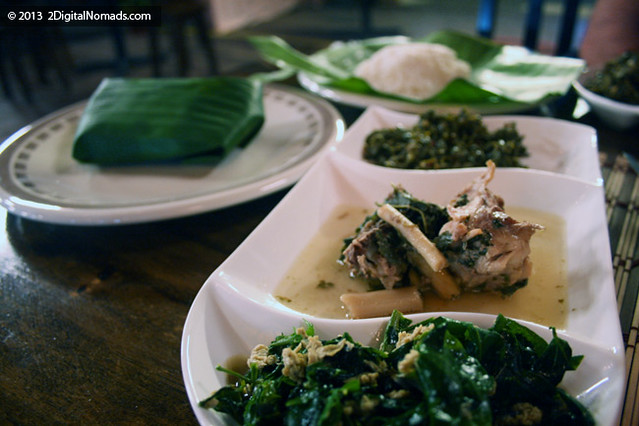
Bamboo chicken, tapioca leaves and rice in banana leaf
Sarawak Laksa
Though we didn’t taste Penang dishes in Malaysia (which are known to be the best), we found in Kuching a large variety of different and delicious dishes—much more than in the second state of Eastern Malaysia (Sabah). One of our favorites was the local curry soup called Sarawak Laksa.
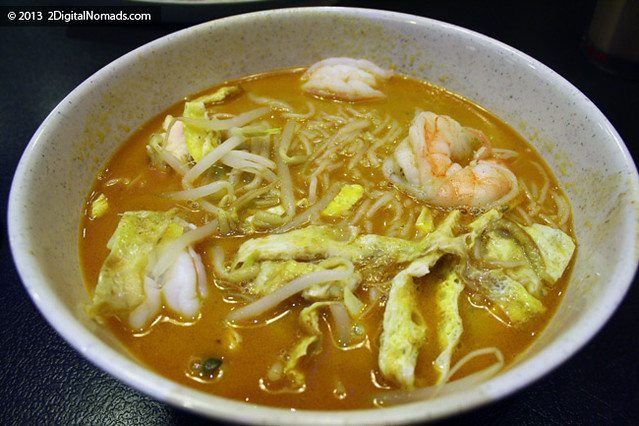
Sarawak Laksa curry soup
Teh Tarik
This Indian milk tea is the Malaysian national drink. After this tea, it is difficult to go back to any other tea. I liked it iced.
Air Sirap
This is a rose syrup. It is very refreshing and goes along with whatever you eat. It is also the cheapest drink in Malaysia. You can also have it with milk.
Morning Glory
This is a kind of leafy vegetable cooked all around Asia.
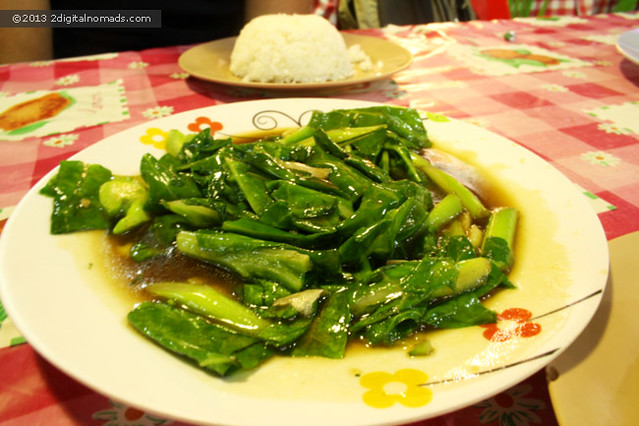
Morning Glory
ABC Dessert
A typical Asian dessert made of cranked ice and other ingredients like sweet beans, sweet corn, and ice cream. It is difficult to describe—you just have to taste it. It goes well with the hot tropical weather.
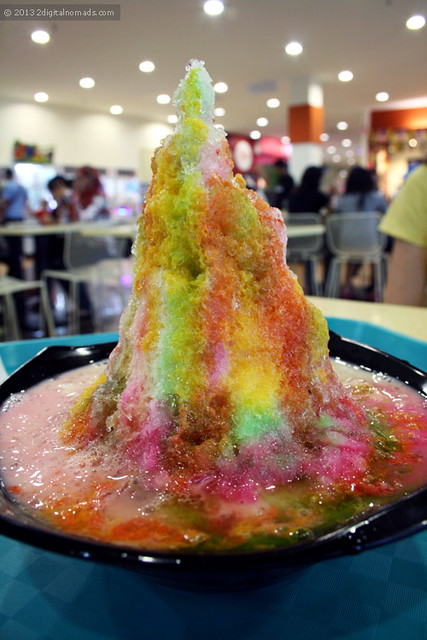
ABC dessert
Noodles
In addition to the very famous Pad Thai found in Thailand, there are many other kinds of tasty noodles all over Asia. Both the type of noodle and the recipe can vary, so they all taste very different.

Fish balls Noodles
Kaya Bites (aka Kaya Balls)
This is a kind of waffle/pastry-style street sweet filled with coconut paste (almost like honey in texture). Delicious!
Mango & Sticky Rice
After five visits to Thailand I don’t know how I could have missed this, as I love mangos! This is definitely my favorite Asian dessert. It is not too sweet, and is made with natural products.
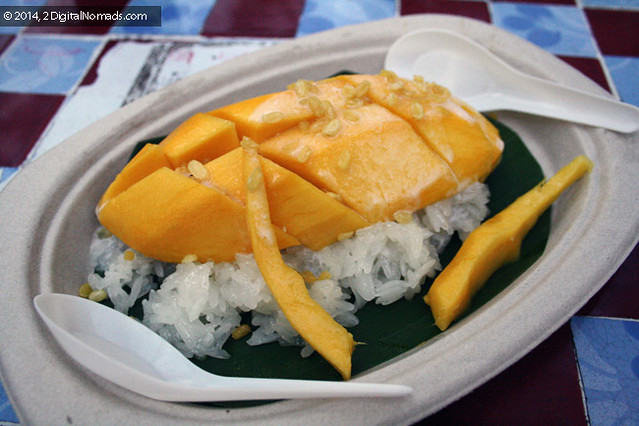
Mango sticky rice
Of course, we’ve missed a lot of other dishes and foods, and we haven’t mentioned all of our culinary experiences, which were sometimes not so nice. (For instance, the Thai soups that we tried to swallow in a restaurant in Bangkok but that were so spicy [I eat spicy, but this was a stomach killer, a suicide attempt!]. The waiter warned us but we answered, “Come on, we know. We’re used to it.” Also the durian fruit that Asians are so fond of but that I really didn’t like. Maybe I need to try more.) The chinese “Wat Tan Hor” that I just couldn’t finish even half of it (just by the sight of it, many people wouldn’t try) Bassel in fact couldn’t even look at me while I was eating. We also haven’t mentioned any Middle Eastern dishes, as we have dedicated three articles to this part of the world. We also experienced green fresh pepper, fresh tamarind, curry leaves, mate leaves, quinoa, dragon fruit, fried squid sandwiches, fresh coconut juice, Chinese tea and other things.

 Bassel & Ariane, a couple who quit their jobs to realize their dream "traveling around the world". This travel website is our way to share with you the amazing adventures we have had, with the goal of helping to make your own travels more enjoyable.
Bassel & Ariane, a couple who quit their jobs to realize their dream "traveling around the world". This travel website is our way to share with you the amazing adventures we have had, with the goal of helping to make your own travels more enjoyable.
I’ve gotta say you guys have very good taste in food! 😉
Zara @ Backpack ME recently posted…The Faces of HOLI
Awww, thx! There are a lot of really delicious variations everywhere.
La Pizza? 🙂
OMG, ElSult himself on our blog! It’s an honor.
As for the pizza, sure but we need–first–to visit Italy and then update our list 🙂